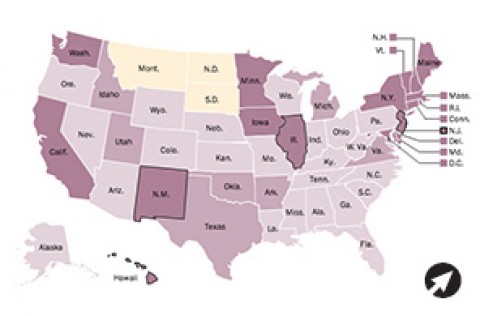The Supreme Court on Wednesday stopped Virginia officials from issuing marriage licenses to same-sex couples, putting on hold a lower-court ruling that said the unions could start Thursday.
The court stayed a decision by a panel of the U.S. Court of Appeals for the 4th Circuit, which on July 28 agreed with a district judge’s ruling that Virginia’s ban is unconstitutional. The same panel declined last week to delay its ruling.
The Supreme Court’s action was expected. Its one-paragraph order came without noted dissent from any of the nine justices and was consistent with its decision granting a stay in Utah, another state where a ban was found to be unconstitutional.
The decision indicates that the high court wants additional lower courts to weigh in instead of giving what might be construed as implied approval of an unbroken string of federal court decisions striking down state bans on same-sex marriages.
Virginia clerks and clergy members had begun preparing for a stream of same-sex couples seeking marriage licenses. But the order brought an abrupt halt to those preparations, which included new state forms that substituted the word “spouses” for “bride and groom.”
In Arlington County, Circuit Court Clerk Paul Ferguson had redeployed staff to help process licenses and set aside a jury room for an overflow crowd. The group People of Faith for Equality in Virginia had lined up more than 50 clergy members to be on hand at courthouses Thursday morning to officiate.
The Supreme Court stepped in after defenders of the law and Virginia Attorney General Mark R. Herring (D) asked for a stay. Herring believes the law is unconstitutional and joined those challenging it, but he said it would be disruptive to allow marriages to begin before the Supreme Court decided the ultimate question of whether state bans violate the U.S. Constitution.
Herring said in a conference call with reporters that he knew the action was disappointing to same-sex couples but that he was “going to fight as hard as I can” to get the Supreme Court to agree to decide the ultimate question of whether states are prohibited from withholding the fundamental right to marry from gay couples.
Challengers of the Virginia ban and supporters of the voter-approved measures restricting marriage to a man and a woman have asked the court to use Virginia as a test case to decide the issue.
In the order, the justices said only that the stay would remain in effect until they decide whether to take the Virginia case. If they do, the stay will remain in place until the court renders a final decision.
The court could consider as early as next month whether to accept the Virginia case, but there is no deadline for a decision. State bans in Utah and Oklahoma have also been struck down by appeals courts, and those states have requested Supreme Court review as well. And appeals courts across the country are hearing cases from additional states.
The stay request that Herring agreed with was filed by Alliance Defending Freedom, a conservative legal organization that represents Prince William County Clerk of Court Michèle B. McQuigg.
The request went to Chief Justice John G. Roberts Jr., who receives emergency requests from the 4th Circuit, and was referred by him to the full court. The circuit covers Virginia, Maryland, North Carolina, South Carolina and West Virginia. Among them, only Maryland has authorized same-sex marriage.
Groups representing those challenging the Virginia ban — the American Civil Liberties Union, Lambda Legal and the American Foundation for Equal Rights — had told the court that the marriages should go forward because it was likely the lower court’s decision would be upheld.
The Virginia decision was typical of a string of federal court decisions finding such bans unconstitutional after the Supreme Court’s ruling in U.S. v. Windsor. The court struck down a part of the Defense of Marriage Act that provided a federal definition of marriage as only between a man and a woman.
While the ruling did not decide whether state bans were unconstitutional, federal judges have said the reasoning the court used meant that the restrictions could not stand.
Virginia’s voters in 2006 put the restrictions in the state constitution, prohibiting gay marriages and recognition of same-sex marriages performed where they are legal.
The conservative Family Foundation of Virginia said in a statement Wednesday that it was “pleased that for the sake of Virginia’s families and all involved that the Supreme Court showed consistency and granted a stay just as it has in other similar cases.”
But Virginia Gov. Terry McAuliffe (D) said the action “is a temporary delay to the inevitable conclusion that Virginians who love each other should have the opportunity to marry regardless of their sexual orientation.”
Carol Morello contributed to this report.


